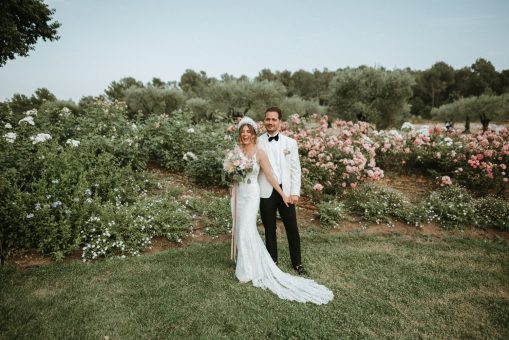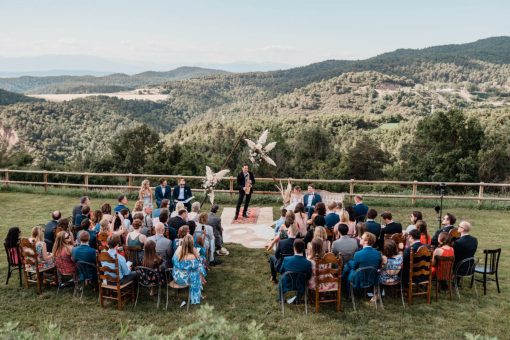Getting Married In Spain
Madrid
overview
From the sultriness of Seville, to the epic romance of the White Isle, Spain and the Balearics represent prime destination wedding territory. Getting married in Spain affords you reliable weather, mouthwatering food and breathtaking landscapes which translates into pretty exceptional memory making potential if you ask us.
the lowdown
Thanks to a Mediterranean location Spain and the Balearics are deliciously warm. August is the hottest month of the year but even in “cold” January it’s still 10 degrees. October is the wettest month with an average of six days of rain (compared to 13 in October in the UK).
Ease of arrival is appealing, whether it’s by boat to major ports Santander and Bilbao, air to Barcelona, Madrid or the Balearics or rail from France or Germany.
Getting married in Spain is foodie heaven – think traditional paella or gazpacho and sunrise churros and hot chocolate after dancing the night away. As Spain is a renowned producer of wines such as Rioja and Valdepeñas (Hemmingway’s favourite), as well as sherry, vermouth and sangria, your cup will not run dry.
The Spanish tendency towards long, lazy lunches and a penchant for a party makes Spain a fabulous place to tie the knot. And that’s before you even consider the Spanish wedding tradition of seguidillas manchegas (the “money dance”) and custard cream wedding cakes.
The Beaches (Costa del Sol), mountains (Andalusia), cities (Salamanca, Toledo, Grenada) and awe-inspiring architecture (everywhere) caters to the full spectrum of Spanish wedding venues. And, of course, weddings here benefit from one thing that no amount of money can buy – the backdrop of an iconic Spanish sunset.
Make sure to check out our roundup of the best wedding venues in Spain.
insider note...
A typical Spanish wedding (especially in the summer) kicks off later in the day to avoid the more intense heat, with the feasting beginning at the average Spanish dinnertime, around 10pm. Expect to be celebrating into the early hours –the Spanish like to take their time.
Flight Duration
1.30 – 4 hours, depending on departure and arrival points.
Currency
Euro
Language Spoken
Spanish & Catalan but English is widely spoken and understood.
Vaccinations
n/a
Transportation
RENFE runs high-speed trains across the country and towns such as Madrid and Barcelona have their own Metro networks. Look for the green light if you want to hail a taxi in the street – Spanish taxis wont take more than four people at a time and they’re harder to find on Friday and Saturday nights. Most cities have plenty of buses with tickets available on board or at estancos (tobacconists).
Public Holidays
All the big religious holidays such as Easter and Christmas, as well as Three Kings Day/ Epiphany (6th January), Labour Day (1st May) and Hispanic Day (12th October). Many of the regions have their own local public holidays, such as Balearic Day in the Balearic Islands (1st March).
Good Time to Go
Late April - Early October
good to know
Spain is recognised as one of the sunniest countries in Europe, with over 300 days of sunshine per year. That sounds like good odd's to us...
the marriage
LEGAL REQUIREMENTS FOR GETTING MARRIED IN SPAIN
Unfortunately for most, you can only legally marry in Spain if you are Catholic and wish to get married in a Roman Catholic Church or you are legally registered as a Spanish resident and wish to have a civil ceremony. Increasingly, many couples are choosing to have a low-key civil ceremony at a registry office in the UK to fulfil the legal requirements followed by a Wedding Blessing/Humanist Ceremony in Spain—regarding this as their actual ‘Wedding Day’ — where they share vows and exchange rings in the presence of their friends and family.
Civil Ceremony
✕You can have a civil ceremony if:
…one of you is a Spanish citizen and can provide proof of local residency.
…neither of you are Spanish citizens but one/both of you can prove that you’ve been legally resident in Spain for the previous two years.
This also applies to same-sex couples. It has been legal for same-sex couples to be married in Spain since 2005.
If you would like more information on the application process and documentation required, download our printable Full Guide to Getting Married in Spain.
download full guideReligious Ceremony
✕You can have a religious ceremony if:
… one/both of you are Catholic and neither of you are divorced. No residency rules apply so it is perfectly okay if neither of you live in Spain. A Roman Catholic wedding is legally binding and will take place in a Roman Catholic Church.
Although it is possible to for other religions to marryin Spain e.g. Protestants, Muslims, Jews, the marriage will not be considered valid in your home country without a civil registry. (i.e You will also need to legally marry in your country of residence.)
If you would like more information on the application process and documentation required, download our printable Full Guide to Getting Married in Spain.
download full guideWedding Blessing / Humanist Ceremony
✕The private, non-denominational, non-institutional nature of a Wedding Blessing or Humanist Ceremony gives you the flexibility to marry when,whereand how you want. There is no legal requirement for the ceremony to take place in a licensed building. Therefore, you can hold your ceremony wherever you like—at your favourite restaurant, in a private villa, on a secluded beach or in the middle of an olive grove. The choice is yours. There is no legal requirement for the ceremony to follow a set structure so it can be as formal or informal as you like—you can have a traditional Church Ceremony with the religious parts replaced with readings and vows or you can have a light-hearted ceremony with humorous readings and vows. Once again, the choice is yours. These ceremonies are usually performed by a celebrant who will be able to help you select the style, structure, readings, music and vows that reflect your tastes and feelings as a couple resulting in a highly personalised and unique, non-religious ceremony.
Please note: If you do choose to have a Wedding Blessing or Humanist Ceremony you will also need to have an official civil ceremony in order for your marriage to be legally binding.
If you would like more information on the application process and documentation required, download our printable Full Guide to Getting Married in Spain.
download full guide




